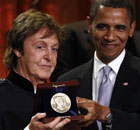Foreign and Military Affairs
Hu to discuss Central Asian security at SCO
By Ai Yang (China Daily)
Updated: 2010-06-04 07:52
 |
Large Medium Small |
Beijing - Security in Central Asia will be on the agenda as Chinese President Hu Jintao attends the Shanghai Cooperation Organization summit next week in Uzbekistan.
The three-day annual SCO summit, which starts June 9 in the Uzbek capital Tashkent, is also expected to approve a draft proposal on admitting new members.
| ||||
The SCO, an observer of the United Nations General Assembly, is made up of Russia, China, Kyrgyzstan, Uzbekistan, Kazakhstan and Tajikistan. Some of its observers - India, Iran, Pakistan and Mongolia - have expressed hopes for full membership.
"Russia and China agree that the SCO has become a key factor in stronger stability and security in Central Asia and an important mechanism of economic growth in the region," Russia's Itar-Tass news agency quoted Russian Foreign Ministry spokesman Andrei Nesterenko as saying.
Experts say the six-nation group is sure to expand in the future as its influence in Eurasia grows, but it's not likely to take in new members too quickly.
Iran and Pakistan have submitted applications and SCO secretary-general Muratbek Imanaliyev said in February they were being assessed.
"The increasing interest in the SCO shows that the bloc's international influence is growing, both economically and strategically," said Sun Zhuangzhi, a senior researcher in Central Asian studies at the Chinese Academy of Social Sciences.
Xinhua quoted Chinese Foreign Minister Yang Jiechi as saying that China will make sure the $10-billion credit extended to other SCO member states is used for the best, and members have agreed on regional affairs, including Central Asia security and stability, the international role of the SCO and its links with other organizations.
Some Western observers worry that the organization and its observing nations, covering 61 percent of Euro-Asia, has a military and political potential capable of more than counterbalancing the developed world, but Chinese experts say such a force will only serve to benefit the globe as a whole.
"The SCO's pursuit is different from the West's. Although its influence is on the rise, right now it's nowhere near a challenge to the United States or NATO," Xing said. "The agency does not have the military ambition feared by the West, and its work in Afghanistan is mainly focused on counter-terrorism, not the military as a whole."










